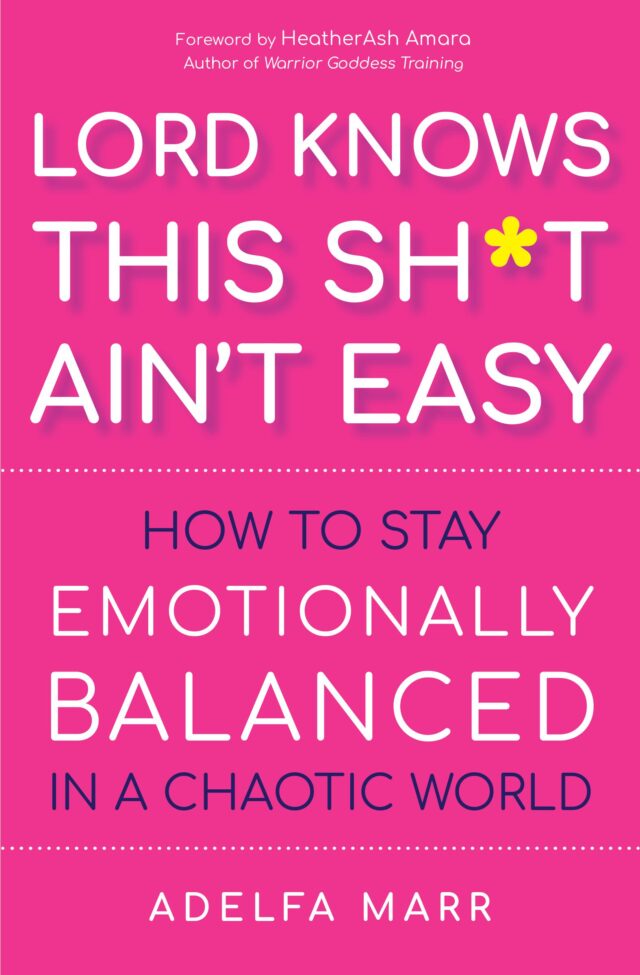Hitchhiking to Freedom
Dear readers,
As an editor at a spirituality and self-help publisher, I learn profound lessons from all the books and authors I work with. In fact, I often joke that it’s like getting paid to do therapy all day—there’s just no way to spend so much time reading and editing uplifting books without having those positive messages sink into my heart and mind. This has never been truer than with Adelfa Marr’s book, Lord Knows This Sh*t Ain’t Easy: How to Stay Emotionally Balanced in a Chaotic World, coming out from Hierophant next month.
I have to admit that I was a little nervous about working with Adelfa. After all, she’s a successful life coach, Instagram influencer, and lives in southern California with her husband actor Manny Montana—about as different a life from my rustic off-grid existence as you can get! How would we relate to each other as author and editor? Yet I soon found out we had a lot in common. On the very first page of her book, Marr writes of her struggles with anxiety and overthinking:
In my mind, being in control of my emotions—and ideally, the emotions of everyone around me—was the only thing that could keep me safe… I truly believed that I could eliminate any uncertainty, awkwardness, or discomfort from my life if I just thought hard enough.
When I read these words, I felt like I’d been struck by lightning.
Like Adelfa, I’d spent long periods of my life believing that I was responsible for, well, everything. It was my job to defuse conflicts, pre-empt disasters, and eliminate all negative emotions in myself and everyone around me. I was constantly rehearsing conversations, convinced that if I could just think of the perfect thing to say and the perfect way to say it, I would magically gain control over the situations that scared me. Yet for all my thinking and planning, life continued to be as awkward, uncertain, and uncomfortable as ever, and even my “successes” at controlling outcomes failed to bring me lasting peace.
As I slowly read and edited Adelfa’s manuscript, I began to remember a time in my life when I hadn’t been so fearful and controlling—when, in fact, I’d routinely taken risks that many people would find uncomfortable, with complete trust that everything would turn out OK.
At eighteen years old I was obsessed with hitchhiking. In high school, I’d read The Hitchhiker’s Guide to the Galaxy, Even Cowgirls Get the Blues, and On the Road. I’d also recently discovered mysticism, and begun devouring the works of Rumi and Lao Tzu. Between the swaggering characters I encountered in the novels and the thrilling ideas I absorbed from the poems, I was filled with eagerness to hit the open road and discover these states of freedom for myself.
I’ll never forget the day I walked to the side of the highway and stuck my thumb out for the first time, carrying a backpack stuffed with books and a guitar I had no idea how to play. The sky was clear and blue, and the air pleasantly chilly. I was filled with a sense of hope, possibility, excitement, and absolute trust. I trusted my body to walk for miles if I needed to, and my instincts to turn down rides that didn’t feel safe. I trusted my long johns and raincoat to keep me warm and dry if the weather turned stormy. Most importantly, I trusted in life. I believed that everything was a kind of teacher—the road, the drivers, the weather—and I was open to all of it, with a near-total absence of fear.
For me, hitchhiking represented a voluntary surrendering of control. I didn’t know who I would encounter on any given day, where I would sleep, or whether I would spend hours in a state of hunger, wet, or cold. Although cell phones existed at the time, they were not yet ubiquitous, and I was unencumbered by one. I was happy not knowing, and not having the option of knowing—content with being confined to the present moment, to the direct sensory experiences of wind, sunshine, and rain, and to the feelings of joy, curiosity, pride, and trepidation that came and went like passing clouds.
For the next four years, I hitchhiked on a regular basis—a short trip here, a long expedition there, sometimes alone and sometimes with a friend. I slept in public parks, in strangers’ homes, and in the occasional campsite or motel room. I interacted with people from all walks of life, and became very competent at meeting my own basic needs and staying calm and cheerful under all sorts of conditions. Those years were a magical period in which my tendency to trust was at an all-time high, and my tendency to control was at a corresponding low.
This all changed when, at age twenty-two, I got into my first “serious” relationship with a man I’d met after—what else?—hitchhiking to San Francisco. Interestingly, the easy and expansive sense of trust I’d felt towards the universe while hitchhiking dissolved abruptly when it came to trusting a specific person. I felt anxious about my partner’s eating habits, his approach to finances, his behavior in social situations, and a myriad of other subjects. My not-so-subtle attempts to control these things did little to gain me the sense of safety I craved, while doing much to aggravate my partner.
In Lord Knows This Sh*t Ain’t Easy, Adelfa Marr writes, “When you put your anxieties in charge, the first thing they do is cannibalize your joys.” This was certainly true for me. Like a swarm of termites, my anxieties about being vulnerable to another person swiftly began to bore holes in the joy I felt at falling in love. Before I knew it, I had turned from a carefree hitchhiker into a micromanaging control freak. Although I had no problem trusting strangers with lead feet to give me rides down winding forest roads in the backs of their pickup trucks, I could barely let my partner drive me across town without holding my breath and clenching my foot on an imaginary brake pedal, convinced it was only my hypervigilance that kept us from crashing.
Over the years I stayed in that relationship, this mystery tormented me: how could I be so trusting in some domains of life, and so controlling in others? What was it that made me shift so dramatically between these two states? When I was alone, I could sometimes recapture the sense of cosmic certainty I’d experienced in my days on the road; yet when I was with my partner, I often found myself in an anxious, contracted state that was anything but mystical. Which one was my “real” self? Was I a trusting, mystical person or a neurotic, controlling person?
It was only while editing Adelfa’s book that I finally stumbled upon the answer: I wasn’t inherently trusting or inherently controlling. These qualities simply appeared or disappeared based on how free I perceived myself to be. As an inexperienced twenty-something who had been socialized to value long-term commitment, it didn’t occur to me that I had the freedom to leave my relationship. It therefore became ever more important to control my partner and somehow turn him into the person I wanted him to be.
As a hitchhiker, I knew myself to be free, and could therefore accept all kinds of uncomfortable experiences, knowing I could always leave. I didn’t need to control things to feel safe, because my freedom was my safety. In the context of my first big relationship, I’d believed myself to be bound, and therefore fought tooth and nail to ensure that things would go my way. I’d forgotten my freedom like some precious coin that rolled under the couch, and with it, lost my sense of safety. For me, therefore, regaining that sense of mystical trust was contingent on regaining a sense of freedom. The more I learned to bring my hitchhiker self to my relationships, the better a partner I became—and the less I felt the need to control the minutiae of my own life and the lives of those around me.
In Lord Knows This Sh*t Ain’t Easy, Adelfa Marr gives us practical ways to reorient our lives towards trust, spontaneity, and ease, no matter how far down the rabbit hole of control we may have fallen. The tools she shares have been life-changing for me, and I believe many readers will feel the same way. I wish her wise, entertaining, and deeply relatable book had been around when I was twenty-two. As it is, I will be handing out copies to everyone I know—and to every hitchhiker I pick up along the lush Hawaii roads, trusting that they are all teachers in disguise.
Sincerely,
Hilary Smith
Senior Editor, Hierophant Publishing
Click here to read Hilary's previous essay, "A Tale of Two Waterfalls."
A worldwide pandemic, climate change, social injustices. . .
Over the last few years, it’s seemed like things on the outside are falling apart! Meanwhile, on the inside, many of us are struggling with feelings of unworthiness, fear of failure, and difficulty finding hope—all while trying to be perfect partners, parents, or friends!
In a world that seems increasingly chaotic, unpredictable, and sometimes downright scary, is it still possible to live a happy and fulfilling life?
Beloved life coach and self-care guru Adelfa Marr tackles this question with her characteristic wit, humor, and warmth, and readers will find a refreshing take in her answers.
Marr understands that self-care isn’t all bubble baths and scented candles. This book gets into the messy stuff—the fear, the shame, the regret—and shows how we can all become more authentic, joyful, and courageous versions of ourselves.
Lord knows this sh*t ain’t easy, but with Adelfa Marr as your guide, you may find that it’s not as hard as you think.








